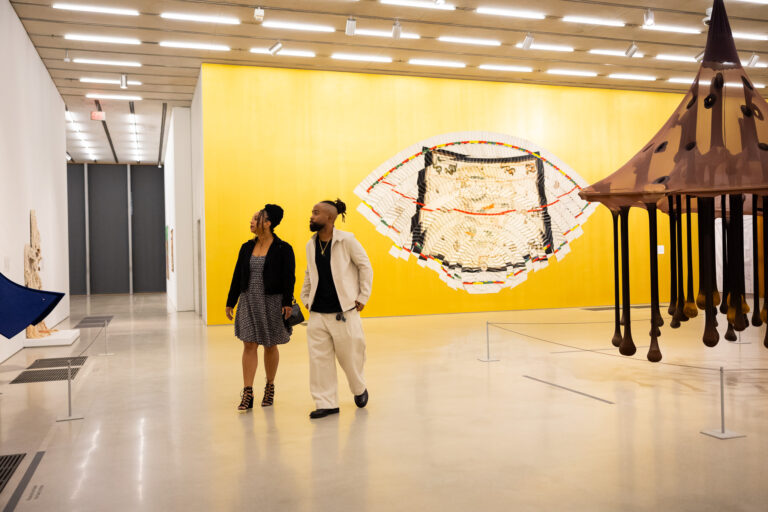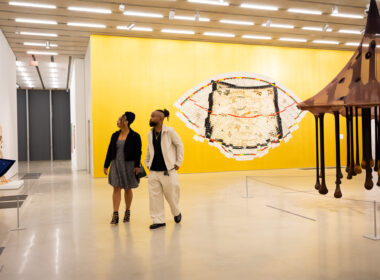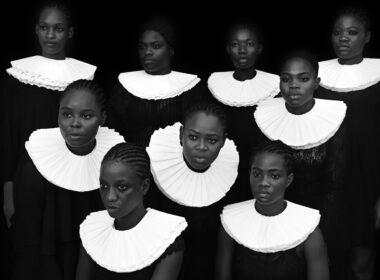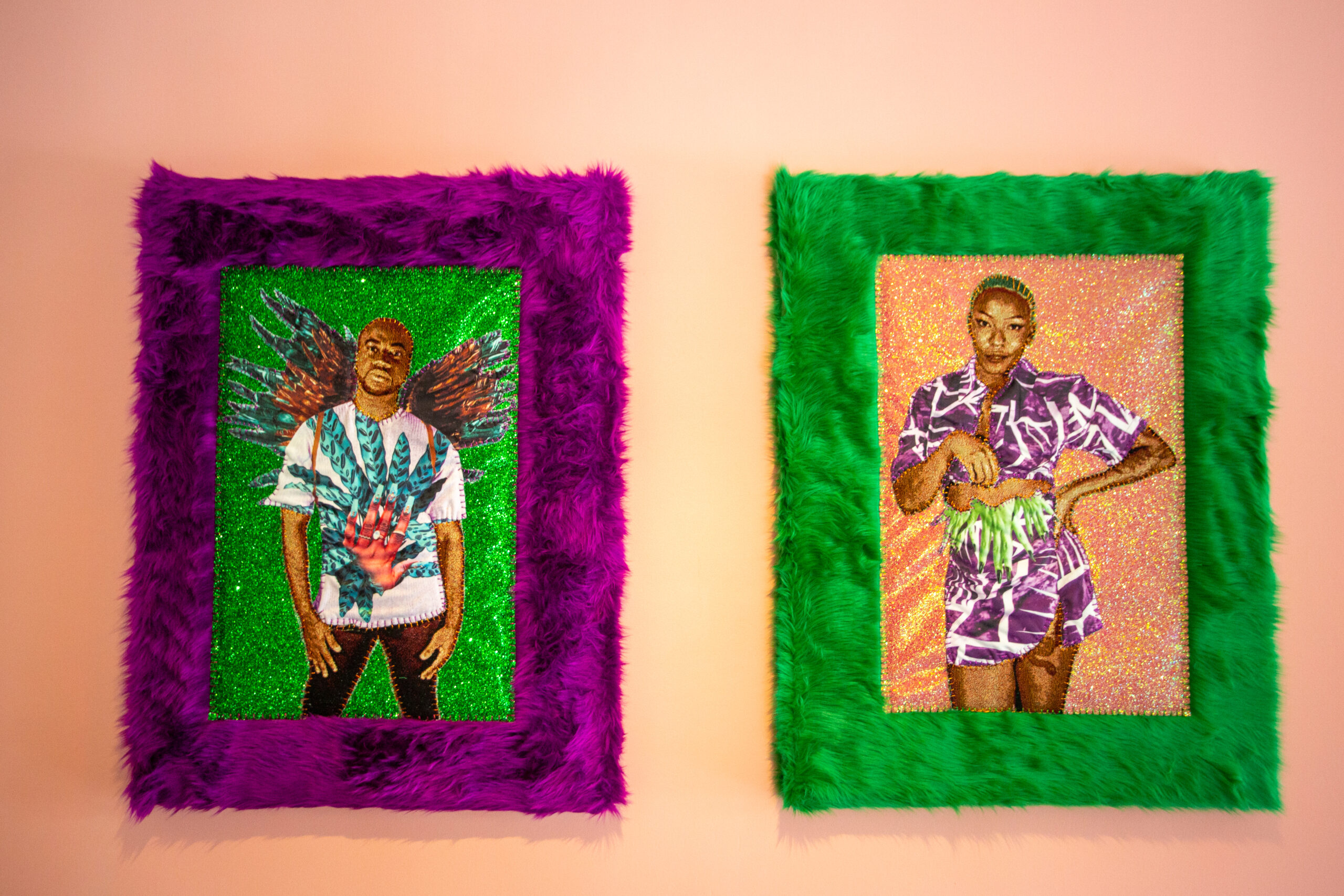Above: April Bey, Don’t Be So Obsessed with Me That You Think You Know What’s Best for Me, 2022. Keep Acting Funny So I Can Be Hilarious, 2022
Colonial Swag, the latest exhibition from mixed media artist and curator April Bey at TERN Gallery in Nassau, Bahamas, considers the history of colonial presence in the Caribbean as source material for a bold series of speculative, futurist works. This writer interviewed Bey about the personal experiences that inspired Colonial Swag.
“In the Bahamas, growing up, we were told that the Queen and the Royal Family was the embodiment of God on Earth. She got our money. Her image is on banners, government houses, and in our schools. So, to me, she was a part of the hierarchy that set protocols and set culture in my country, and I had that type of respect for this authority without really understanding where it came from.”
Modern rule of the British monarchy in the Caribbean is an institutionalized formality. This pseudo-benevolent indoctrination forces the people to be beholden to outdated and undemocratic performances of political power. On July 10, 1973, the Bahamas, one of 54 countries under British colonial rule, gained independence and declared itself The Commonwealth of the Bahamas. Though that declaration disbanded the formal colonial system, it did not entirely erode the political stronghold of Britain over the island.
In recent months, Bahamians have gained traction with an uptick in support for grassroots protests expressing their discontent with Queen Elizabeth continuing to function as the Head of State. Protests have been staged alongside the pageantry of British royal family visits to the Caribbean. Other countries in the Commonwealth of Nations, a collective of former British colonies, also have vowed to obtain absolute autonomy and reform their status as “realms of the Queen.”
“This one family and this long history of a monarchy has colonized and taken over a great deal of the world and impacted a lot of indigenous cultures,” Bey continued. “That’s what I was hoping to convey. The show is an unveiling of a new fashion brand that’s exposing and making commentary on all of the different forms of colonialism that are still in the Caribbean, throughout West Africa, and across the African continent.”
Colonial Swag envisions a world where queer Black aliens from the planet Atlantica come to Earth to study the colonial project in the Caribbean and to create a luxury high-fashion brand inspired by it.
“Atlantica is the planet I am also from,” Bey continued. “We harvest colonialism from Earth and, in particular, developing countries and take the raw materials to create beautiful fashions from forms of colonialism. In this show, I am focusing on the remnant anti-LGBT laws and also aspects of our culture, or what we’re calling our culture, which is very homophobic.”
Colonial Swag renders monuments to Black ecstatic opulence that query and counter-histories of demonized and fetishistic representations of Bahamian culture, queer culture and Black identity.
Core selections featured in Colonial Swag also nod to defiant performativity, a radical and revolutionary feature of global Black creative interventions. The masquerade traditions of carnival, interstellar funk, the anti-respectability counterculture of Afropunk, and the cosmic boundlessness of free jazz, meet at the intersections of the identity formations Bey investigates.
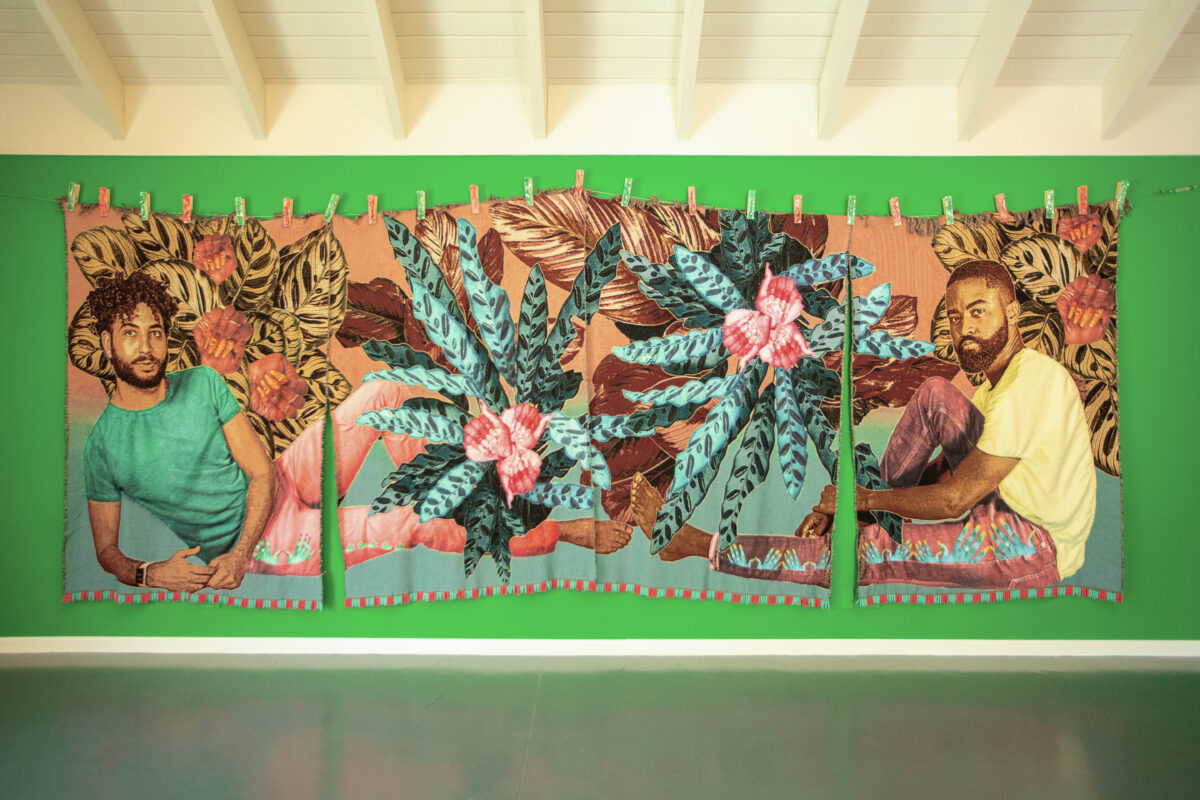
Above: April Bey, Guess Jeans: Mind the Business that Pays You (2022).
In Guess Jeans: Mind the Business that Pays You (2022), a digitally woven blanket with hand-sewn fabric and glitter, two masculine-presenting models recline into a lush assortment of tropical flora. The skin of the models is more golden bronze than it is black, and the beauty of their complexion contrasts nicely with the bold, green plant life surrounding them. What at first glance could be confused as flowers, on closer inspection is revealed to be Black fists. The Black fist and Black hands icon is a timeless homage to Black liberation struggles.
Bey elevates this image by adding ornate acrylic nails and rings to the fists. The revision not only modernizes the iconic image, it also queers it by appropriating a stoic heteronormative signifier and focalizing rather than erasing femme-identifying subjects.
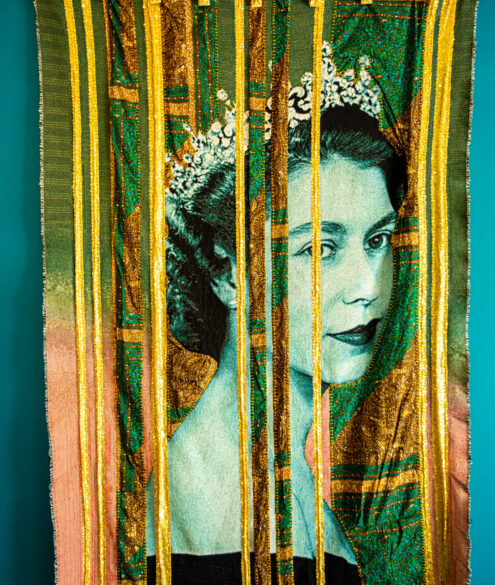
Above: April Bey, You Told Harpo to Beat Me (2022).
In You Told Harpo to Beat Me (2022), a woven tapestry with hand-sewn fabric and sequins, Bey commandeers an archival portrait of Queen Elizabeth to trouble the presumed benevolence of the monarch’s image. Queen Elizabeth is portrayed behind a gilded striation of Chinese batik textile strips. The strips are likened to bars, a cage, or windows that create a barrier which separates the Queen from her subjects.
Bey’s reimaging of the iconic image doubles down on the literal and satirical status of the monarch as a political figurehead. The Queen is shown as a disconnected specter who peers down from her station but remains out of touch with the postcolonial world. The textile posits important questions about why a free Caribbean needs futile idyllic representations.
When asked why Bey chose to work with unconventional tapestries, materials, and processes for this collection of textiles that are not traditionally considered “indigenous” to the Bahamas, they replied, “I’ve done a lot of research on textiles, the processing of them, the materiality, and also how they migrated from China to Indonesia, and how the Dutch picked it up and left it in West Africa and utilized West African women to set the taste of wax fabric while leaving them with none of the profits or mobility that comes with the profits.
“The technique and process of making the textiles isn’t necessarily what causes it to be indigenous to the culture. With the fabrics that I’ve chosen in the show, I’m trying to compare Chinese neocolonialism with British colonialism and how colonialism as a concept takes on the same route. Even though we have tons of texts that record and document this route of colonizing, it’s still a map, and no one has changed the route of doing this. It’s a bit absurd to me that we just sit and watch it happen when it has happened so many times.”
The violence of colonial projects, the residual pathologies, and systems that persist despite independence movements, is the subtlety of their pervasiveness and our passive acceptance of their continued existence. Bey was asked why they would engage a capitalist model to critique the colonial project, when so many disparities in the Caribbean and Global South result from economic inequity and consumer culture.
Bey’s response was that the brand is beautiful but inaccessible; no amount of money makes the fashion brands worn by the sitters available to consume as a material commodity. Though the conceptual fashion brand remains unavailable, the artwork that visualizes the concept remains a saleable art object.
The global effects of consumerism, colonialism and homophobia continue to devastate our collective consciousness. Colonial Swag does not pretend to be a magic bullet that singlehandedly defeats colonialism or dethrones the British monarchy. However, the collection does hope to stretch and decolonize our imaginaries about Black queer Caribbean culture. Bey humanizes Black queer Caribbean’s with a collection of exquisitely opulent figurations that each bear mythic origin stories.
Communities in the Caribbean are calling for the eradication of taboos that marginalize and demonize queer identities. Notable scholar-poet Audre Lorde, child of Grenadian and Barbadian parents, affirmed that there can be no hierarchy of oppressions when battling against the systems that perpetuate oppression. Any efforts to free communities from the tyranny of colonial indoctrination also must be dedicated to eradicating all oppressions. The future is now, and although change is slow, it is necessary for our collective healing and evolution. Visualizing unabashedly Black-queer figurations in a world that still openly denigrates and denounces LGBTQIA+ communities is a powerful, defiant act.
